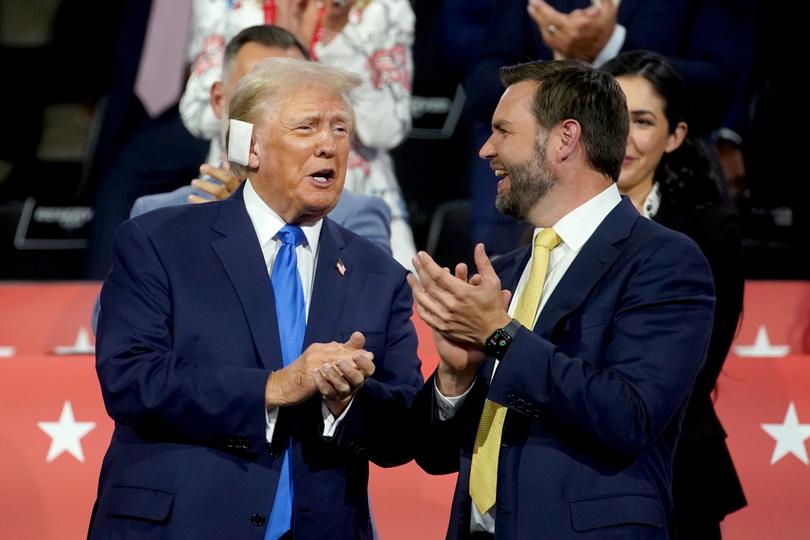The New York Times: How JD Vance’s combative conservatism is shaping Trumpism 2.0
From attacks on ‘childless cat ladies’ to claims of migrants devouring neighbors’ pets, JD Vance is providing a glimpse of an ultra-online, aggressively combative generation of rabble-rousing conservatism.
From attacks on “childless cat ladies” to claims of migrants devouring neighbors’ pets, Sen. JD Vance is providing many Americans with their first glimpse of an ultra-online, aggressively combative generation of rabble-rousing conservatism.
This younger generation has come of age by taking its cues from former President Donald Trump, but Vance is fast becoming its chief emissary — muscling its tactics and language into the national psyche and driving some of the key storylines of the 2024 election.
In this version of Trumpism 2.0, publicity is paramount, precision is passé and controversy is often its own reward. The approach is inviting new criticism — and winning over converts.
Sign up to The Nightly's newsletters.
Get the first look at the digital newspaper, curated daily stories and breaking headlines delivered to your inbox.
By continuing you agree to our Terms and Privacy Policy.Vance’s clearest real-world application of this online ethos has come in recent days as the Republican ticket has grappled with the aftermath of Trump’s poor debate performance and the second attempt in two months on the former president’s life.
Vance, the 40-year-old first-term senator who’s positioned as the anointed successor to the Make America Great Again movement, has responded with a series of increasingly heated criticisms of rivals and a singular, at-any-cost focus on keeping the Trump-Vance team on offense.
On the rally stage, he can easily access his own anger.
It’s not a surprising trait, perhaps, after a hardscrabble youth shaped by the consequences of his father’s absence and his mother’s drug addiction, yet it’s clearly a valuable tool to connect with frustrated and aggrieved supporters.
But he veers between chest-pounding aggression and the desire to appear like a happy warrior, while Democrats see something else — a leading Republican they view as willing to traffic in anti-migrant attacks anchored in racist tropes.

Vance fervently jousts with cable news anchors while maintaining a mostly well-mannered demeanor, mindful that the vicious attacks that score likes and shares on hand-held devices can easily backfire when broadcast into American living rooms.
He excoriates the news media as pernicious and corrupt in speeches that open his campaign rallies. But at the end of the events, he regularly takes questions from news organisations and almost never directly criticises the reporters who line up to parry with him.
Instead, his Trump-loving crowds are happy to do the booing for him, presenting Vance with the chance to appear above the fray as he reassures his audiences that a particular reporter is “one of the good ones”.
Even when Vance can’t resist the chance to dunk, he is quick to add that it was only meant in good fun.
“There is a big generational difference between JD Vance and anything we’ve seen before this point,” said Josh Holmes, a Republican strategist. “And for a younger generation, he has been remarkably effective in the attack dog role.”

Holmes has navigated both sides of the conservative divide. He works closely with establishment Republicans, most notably as an adviser to Mitch McConnell, the party’s leader in the Senate.
And he’s vested in the younger generation of conservative provocateurs as a co-host of a popular podcast, Ruthless.
One of the show’s recurring segments, King of the Hill, is a round-robin-style mocking of social media posts from Republicans “who’ve since lost their minds and become liberals”.
Shashank Tripathi, a well-known online instigator, is referred to by his fellow co-hosts almost exclusively by his social media handle, Comfortably Smug.
“The Republican ticket required a younger voice, one that could connect with lower-propensity, young males in the base,” Holmes said. “We’re talking the 25-to-50-year-old Trump fans, and Vance is just very comfortable with them.”
Vance is not merely a creation of online conservatism. He rose to fame with the help of a more old-fashioned media platform, writing a bestselling memoir.
But his proclivity for the fight, his willingness to push the boundaries in a political battle and his undeniable youth made him a darling of online conservatism as he shed his equally provocative past as a Never Trumper.
He has explained that conversion with a now-familiar refrain of blaming the news media, which he said had misled him about the true character of the man he once referred to as America’s Hitler.

Early in his 2022 campaign for Senate, Vance’s intense opposition to vaccine mandates caught the attention of conservative social media influencers. His statement that “only mass civil disobedience will save us from Joe Biden’s naked authoritarianism” quickly went viral.
By the end of that contest, he was a frequent prime-time guest on Fox News and was close with Tucker Carlson, who was, at the time, the network’s biggest star, as well as with Trump’s eldest son, Donald Trump Jr., who hosts his own combative podcast, Triggered.
Both men were crucial voices in helping Vance win the vice presidential nomination.
But it has been Vance’s performance on the trail and in the news media that has revealed both the opportunities and the limits of putting the future of the Republican Party in his hands.
On Sunday, during a live interview on CNN, he delivered a phrase that will live in the “alternative facts” pantheon of remarkable Trump-era expressions when he described his willingness to “create stories” to help spotlight important issues.
“If I have to create stories so that the American media actually pays attention to the suffering of the American people, then that’s what I’m going to do,” Vance said.
His answer had been in response to a question about the Republican ticket’s campaigning on false claims that Haitian migrants were eating dogs and cats, as the campaign sought to attack Vice President Kamala Harris and her immigration policies. His rivals quickly framed his answer as an admission of a cynical lie.
Vance’s point was that the concerns of his constituents who had made the allegations were real and that he had provided them with a much-needed national media spotlight.
“I say we’re creating a story — meaning we’re creating the American media focusing on it,” he said when pressed about the phrasing on CNN.
It was a familiar part of political meme culture. Carefully cropped images do not provide the complete picture, but the full set of facts is often deemed less important than amplifying a particular message.
“My standard for whether I talk about something,” Vance said Tuesday in response to a reporter’s question at his event in Eau Claire, Wisconsin, “is whether enough people that I trust bring it to me, at least to the point where I feel like I’ve got to investigate it myself — not just trust the media to do their job, because a lot of times they don’t.”
Earlier in the event, he acknowledged that he had not fact-checked his constituents’ claims about the pets. “The media has a responsibility to fact check,” he said.

On Monday, Vance’s influence on the campaign was apparent again as he channeled his anger over the apparent assassination attempt. “I was, without a question, bothered by it more than he was,” Vance told an audience in Georgia about learning of the incident in a call with Trump.
After the first attempt in July, before he had been selected to the ticket, Vance rushed to blame Democrats for the shooting at a rally in Butler, Pennsylvania, even as the Trump campaign focused on a message of unity.
Some inside the campaign were irritated by Vance’s aggressiveness.
This time, following the second attempt on Sunday, Vance had Trump’s blessing to go full-throttle.
During his speech in Georgia, Vance seemed to be on the verge of condemning excessive partisanship as he called for a reduction in the “inflammatory political rhetoric coming from too many corners of our politics.”
A stunned audience responded with polite but confused applause.
But Vance quickly made it clear that was only the preamble for a chilling attack that blamed Harris and her fellow Democrats for both assassination attempts.
“No one has tried to kill Kamala Harris in the last couple of months, and two people now have tried to kill Donald Trump in the last couple of months — I’d say that’s pretty strong evidence that the left needs to tone down their rhetoric and needs to cut this crap out,” he said.
“Somebody is going to get hurt by it, and it’s going to destroy this country.”
Vance acknowledged that conservatives don’t always strike the right notes and vowed to “do my part to tone down the rhetoric.”
After the event, he posted a 1200-word message on social media that offered a window into his conflicting desire for peace and calm, and his instinct to take aim at opponents. The post has received about 18 million views on the social platform X.
The following day, that internal battle remained unresolved. At an event that afternoon in Sparta, Michigan, he said the totality of all the nation’s problems were the result of one person: Harris.
“Her policies,” he said, “have caused every single problem we see in this country over the last 3 1/2 years.”
This article originally appeared in The New York Times.
© 2024 The New York Times Company
Originally published on The New York Times
